Hyundai Tucson vs Kia Stonic - Differences and prices compared
Costs and Efficiency:
Price and efficiency are often the first things buyers look at. Here it becomes clear which model has the long-term edge – whether at the pump, the plug, or in purchase price.
Kia Stonic has a clearly advantage in terms of price – it starts at 20100 £, while the Hyundai Tucson costs 30600 £. That’s a price difference of around 10500 £.
Fuel consumption also shows a difference: Hyundai Tucson manages with 1 L and is therefore decisively more efficient than the Kia Stonic with 5.60 L. The difference is about 4.60 L per 100 km.
Engine and Performance:
Under the bonnet, it becomes clear which model is tuned for sportiness and which one takes the lead when you hit the accelerator.
When it comes to engine power, the Hyundai Tucson has a significantly edge – offering 252 HP compared to 115 HP. That’s roughly 137 HP more horsepower.
In acceleration from 0 to 100 km/h, the Hyundai Tucson is noticeable quicker – completing the sprint in 7.90 s, while the Kia Stonic takes 10.70 s. That’s about 2.80 s faster.
In terms of top speed, the Hyundai Tucson performs a bit better – reaching 204 km/h, while the Kia Stonic tops out at 182 km/h. The difference is around 22 km/h.
There’s also a difference in torque: Hyundai Tucson pulls clearly stronger with 379 Nm compared to 200 Nm. That’s about 179 Nm difference.
Space and Everyday Use:
Beyond pure performance, interior space and usability matter most in daily life. This is where you see which car is more practical and versatile.
Seats: offers more seating capacity – vs .
In curb weight, Kia Stonic is distinct lighter – 1205 kg compared to 1542 kg. The difference is around 337 kg.
In terms of boot space, the Hyundai Tucson offers significantly more room – 620 L compared to 352 L. That’s a difference of about 268 L.
In maximum load capacity, the Hyundai Tucson performs noticeable better – up to 1799 L, which is about 644 L more than the Kia Stonic.
When it comes to payload, Hyundai Tucson slightly takes the win – 545 kg compared to 445 kg. That’s a difference of about 100 kg.
Who comes out on top?
Overall, the Hyundai Tucson shows itself to be outperforms in nearly all aspects and secures the title of DriveDuel Champion.
It convinces with the more balanced overall package and proves to be the more versatile choice for everyday use.
 @ Hyundai Motor Company
@ Hyundai Motor Company
Hyundai Tucson
Costs and Consumption
View detailed analysis
Engine and Performance
View detailed analysis
Dimensions and Body
View detailed analysis
Hyundai Tucson
Hyundai Tucson marries bold, sculpted looks with a clever, roomy cabin that feels smarter than its price tag suggests. It's composed on the road, easy to live with day-to-day, and a sensible choice for buyers who want SUV style without the showroom theatrics.
details @ Hyundai Motor Company
@ Hyundai Motor Company
 @ Hyundai Motor Company
@ Hyundai Motor Company
 @ Hyundai Motor Company
@ Hyundai Motor Company
 @ Hyundai Motor Company
@ Hyundai Motor Company
 @ Hyundai Motor Company
@ Hyundai Motor Company
Kia Stonic
The Kia Stonic is a sprightly compact crossover that mixes city-friendly agility with a cheeky, modern design — perfect for buyers who want style without sacrificing sense. Inside it serves up clever practicality and a bright, well-equipped cabin, making everyday driving feel a bit more fun than it has any right to be.
details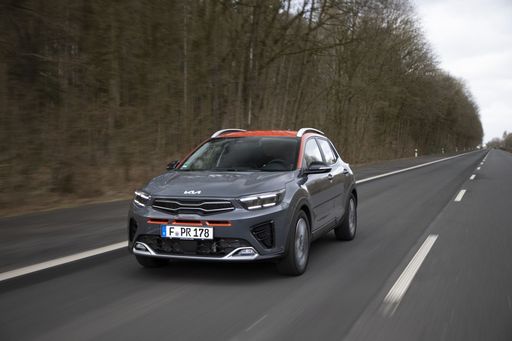 @ Kia Corporation
@ Kia Corporation
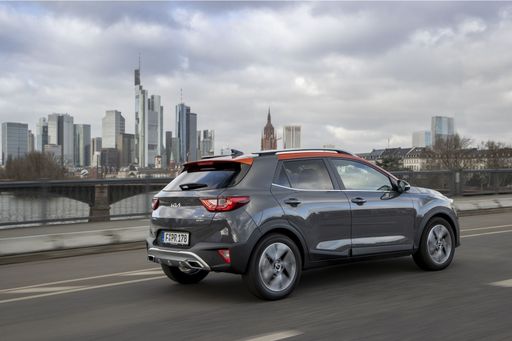 @ Kia Corporation
@ Kia Corporation
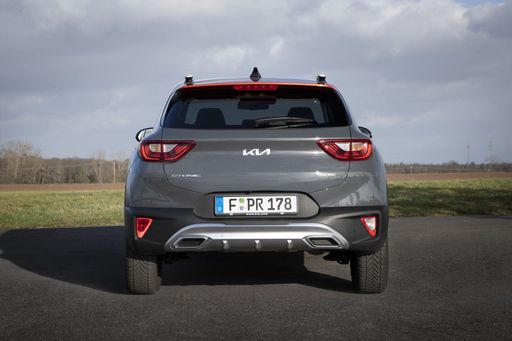 @ Kia Corporation
@ Kia Corporation
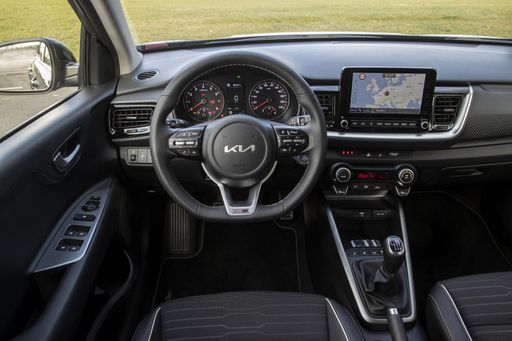 @ Kia Corporation
@ Kia Corporation
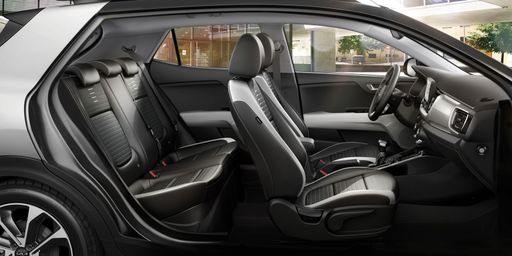 @ Kia Corporation
@ Kia Corporation
 @ Hyundai Motor Company
@ Hyundai Motor Company
|
 @ Kia Corporation
@ Kia Corporation
|
|
|
|
Costs and Consumption |
|
|---|---|
|
Price
30600 - 46300 £
|
Price
20100 - 26600 £
|
|
Consumption L/100km
1 - 7.6 L
|
Consumption L/100km
5.6 - 5.9 L
|
|
Consumption kWh/100km
-
|
Consumption kWh/100km
-
|
|
Electric Range
64 - 70 km
|
Electric Range
-
|
|
Battery Capacity
-
|
Battery Capacity
-
|
|
co2
22 - 172 g/km
|
co2
127 - 133 g/km
|
|
Fuel tank capacity
42 - 54 L
|
Fuel tank capacity
45 L
|
Dimensions and Body |
|
|---|---|
|
Body Type
SUV
|
Body Type
SUV
|
|
Seats
5
|
Seats
5
|
|
Doors
5
|
Doors
5
|
|
Curb weight
1542 - 1889 kg
|
Curb weight
1205 - 1270 kg
|
|
Trunk capacity
546 - 620 L
|
Trunk capacity
352 L
|
|
Length
4510 - 4535 mm
|
Length
4165 mm
|
|
Width
1865 mm
|
Width
1760 mm
|
|
Height
1650 mm
|
Height
1520 mm
|
|
Max trunk capacity
1721 - 1799 L
|
Max trunk capacity
1155 L
|
|
Payload
523 - 545 kg
|
Payload
440 - 445 kg
|
Engine and Performance |
|
|---|---|
|
Engine Type
Diesel MHEV, Plugin Hybrid, Petrol, Full Hybrid
|
Engine Type
Petrol, Petrol MHEV
|
|
Transmission
Automatic, Manuel
|
Transmission
Manuel, Automatic
|
|
Transmission Detail
Dual-Clutch Automatic, Automatic Gearbox, Manual Gearbox
|
Transmission Detail
Manual Gearbox, Dual-Clutch Automatic
|
|
Drive Type
Front-Wheel Drive, All-Wheel Drive
|
Drive Type
Front-Wheel Drive
|
|
Power HP
136 - 252 HP
|
Power HP
100 - 115 HP
|
|
Acceleration 0-100km/h
7.9 - 11.6 s
|
Acceleration 0-100km/h
10.7 - 12.1 s
|
|
Max Speed
180 - 204 km/h
|
Max Speed
179 - 182 km/h
|
|
Torque
250 - 379 Nm
|
Torque
172 - 200 Nm
|
|
Number of Cylinders
4
|
Number of Cylinders
3
|
|
Power kW
100 - 185 kW
|
Power kW
74 - 85 kW
|
|
Engine capacity
1598 cm3
|
Engine capacity
998 cm3
|
General |
|
|---|---|
|
Model Year
2024 - 2025
|
Model Year
2025
|
|
CO2 Efficiency Class
E, B, F, D
|
CO2 Efficiency Class
D
|
|
Brand
Hyundai
|
Brand
Kia
|
What drive types are available for the Hyundai Tucson?
Available configurations include Front-Wheel Drive or All-Wheel Drive.
The prices and data displayed are estimates based on German list prices and may vary by country. This information is not legally binding.
